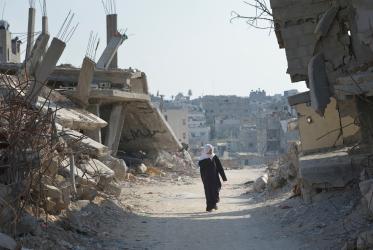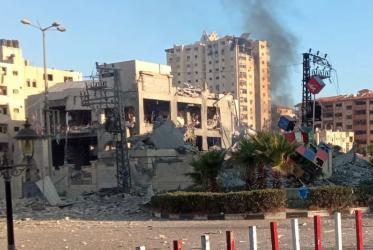This statement is also available in French, German, Spanish, Arabic (pdf) and Hebrew (pdf)
Yesterday, 28 January, President Trump of the United States of America and Prime Minister Netanyahu of Israel presented a proposal for peace in Israel and Palestine – “Peace to Prosperity: A Vision to Improve the Lives of Palestinian and Israeli People”. This proposal was developed without meaningful participation by representatives of the Palestinian people, and primarily in line with long-stated Israeli objectives. It constitutes an ultimatum, rather than a real, sustainable or just solution. No just peace can be established for either Palestinians or Israelis with such a plan.
The World Council of Churches (WCC) has worked and will continue to work for a just peace for both Palestinians and Israelis, based on a process of dialogue and negotiations founded on fundamental principles of international law, and on recognition of the equal rights and dignity of both Israelis and Palestinians. Ultimately, any ‘solution’ that is not based on justice and negotiated agreement will be an imposition and an instrument of oppression.
WCC continues to study the document and to receive analysis and reactions from member churches and partners in the region. However, this proposal clearly gives to one side – Israel – rights they don’t have according to international law, while the other side – the Palestinian people – lose part of what little remains to them today, even the recognition under international law of being occupied, and their aspirations for a viable independent state of their own with East Jerusalem – not just a remote neighbourhood thereof beyond the Separation Wall – as its capital. This proposal recognizes might as right, and disregards principles of international law, justice and accountability.
The territories ‘allocated’ to Palestinians under this plan are small isolated enclaves with no territorial contiguity, separated by Israeli settlements and connected only by bypasses under Israeli control. From the ecumenical movement’s history of engagement in South Africa, we know what such a system looks like. This plan makes permanent the fragmentation of Palestinian territory in a matrix of Israeli control, not unlike the Bantustans of South Africa’s apartheid system. We know that this cannot lead to peace or to justice.
Even if the rampant growth and proliferation of Israeli settlements has made it increasingly unviable, WCC holds the ‘two-state solution’ to be the best path forward towards peaceful co-existence for both Palestinians and Israelis. But it must be a real two-state solution, entailing the establishment of a viable, independent, self-governed Palestinian state, as foreseen in relevant UN resolutions, not simply renaming the current system of occupation and control as a Palestinian ‘state’.
WCC urges members of the international community not to support this proposal or to recognize its implementation unless and until a better plan has been negotiated and agreed with representatives of the Palestinian people and in compliance with the principles of international law regarding belligerent occupation and human rights.
We call upon the government of Israel and the Palestinian Authority to recommit to a process of dialogue and negotiations on these foundations. We affirm the essential role of the United Nations in fostering dialogue based on principles of International Law and for joint efforts to find a sustainable solution for just peace for all. And we call on the government of the United States to strive to act in a less biased fashion in encouraging, supporting and facilitating such a process.
We join with other church leaders around the world in expressing our grave concern that this plan, rather than leading to peace, will instead provoke renewed unrest and violence, and serve only to empower extreme views and actors on all sides.
We pray for the peace of Jerusalem, as a city shared by two people and three faiths. We pray for the Christian communities of the Holy Land, for Palestinians and Israelis, and for all people of the region, that they may know peace based on justice, in recognition of the equal God-given dignity and human rights of all.
Geneva, 29 January 2020
Olav Fykse Tveit,
General Secretary




